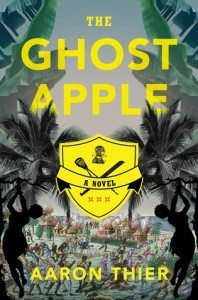Thoughts on ‘The Ghost Apple’ by Aaron Thier
[dropcap]I[/dropcap]t is all too easy to confuse ‘funny’ with ‘light’, ‘not serious’, or ‘amusing’, as if funny films, jokes and books provide that wonderful but ultimately inconsequential drag on the spliff of ‘comic relief’. If you want to say something serious, something head-scratchingly profound, you would be foolish to make jokes about it. Samuel Beckett wrote that ‘Nothing is funnier than unhappiness’. Aaron Thier’s début novel does much to highlight the hilarity of the desperately unhappy times in which we find ourselves.
The Ghost Apple tells the story of Tripoli College, a New Hampshire University. It is 2009 and the University has run into financial ruin. The bureaucratic powers are partnering with the snack corporation Big Anna ®, the Dean of Faculty has gone undercover as a freshman, and Maggie Bell is a young woman with a lot to learn.
[pullquote style=”right” quote=”dark”]It is patently about the marketisation of Public University. [/pullquote]The novel gives a frighteningly funny demonstration of what happens when corporations funnel capital into institutions whose stated goal of free academic inquiry is undermined by the very money that keeps them afloat. You’ve got to laugh, really.
The most striking aspect of the novel is the multiplicity of narrative voices. Thier rattles through 18th century explorer letters, the bumbling elderly Dean’s blog posts, academic module descriptions, staff meeting minutes, emails, advertisements. Thier’s narrative shows an awareness of the frenzied fashion through which we receive information today. We are hit with images, adverts, tweets, blogs, emails and sometimes novels. One would think this would cause the narrative to run along in fits and starts, but Thier manages a stylistic current throughout, the prickly voltage of his humour coursing through the pages.
A few choice lines show the versatility of this new writer in striking different chords. In an early blog post, the Dean describes how he is adapting to the chaotic buzz of University life:
I find that I welcome the noise and distractions. My wife and I ate breakfast together every morning for years and years. We’d make steel-cut oatmeal and read the paper and we wouldn’t say a word, but after she died the silence was different. The silence was so loud that I couldn’t read at all. It’s nice to live in a place where there’s always something going on.
 In a radical proposition by an insurrectionary group, led by former professor Kabaka, from the University, Thier demonstrates his ability to write a sentence that packs a political punch: ‘We are prisoners of neoliberal economics. We are being held without trial. What have we done to deserve it?’. The section is entitled ‘A Modest Proposal’ and the Swift reference is more than justified. A note on a few other names that sprung to mind: the linguistic experimentation has echoes of Gary Shteyngart, a famously satirical author, while the clipped, absurd humour prompted memories of George Saunders, an American writer of mainly short stories. And I do not make these comparisons lightly.
In a radical proposition by an insurrectionary group, led by former professor Kabaka, from the University, Thier demonstrates his ability to write a sentence that packs a political punch: ‘We are prisoners of neoliberal economics. We are being held without trial. What have we done to deserve it?’. The section is entitled ‘A Modest Proposal’ and the Swift reference is more than justified. A note on a few other names that sprung to mind: the linguistic experimentation has echoes of Gary Shteyngart, a famously satirical author, while the clipped, absurd humour prompted memories of George Saunders, an American writer of mainly short stories. And I do not make these comparisons lightly.
Slavery is very much at the heart of the novel. The phrase ‘slavery by another name’ is bandied around a lot today, but finds laser-like, angry articulation here. Big Anna ® snack corporation can be seen as just another version of ‘Killer Coke’ or Nestlé. Slavery and corporate power, then, are not so far removed as the history books may say. As students of ‘Warwick University Limited’ perhaps this book – with all of its commentary on corporate power muscling in on academic freedom – will speak to us concrete jungle dwellers with greater import. Allow me to make a brief comparison between the novel and our humble institution. In a ‘head to head’ section of the Tripoli student newspaper (not unlike the Boar’s feature), a professor in support of the corporate funding asserts the following:
Every aspect of human endeavour is strengthened by exposure to the rigours of the free market, which is the great innovation of our time, and education is surely no exception. The upright and far-seeing businessman and the honest and capable professor represent the combined forces which are to change the Tripoli of today into the greater and better Tripoli of the future.
This voice comes from the novel, but there are haunting echoes with the following statement made in 2002:
I think in the future, education and industry need to become even more closely linked than they have been historically. As government funding changes, the replacement could well come through private funding from companies, individuals and grant-giving agencies.
This is Warwick’s then-chancellor Sir Nicholas Scheele. Whatever people may say about Occupy, as torchbearers of academic freedom in these decidedly unfree times, we have at the very least an obligation to be concerned about the effects of this pedagogical-corporate hybrid. What happens when education and industry become so closely linked that education is shackled unwillingly to its life-giving (and life-denying) support mechanism? It lies vegetative – not alive, not dead, its heart still beating dutifully – but the spirit beaten out of it. Or perhaps parts of its spirit could be sacked and banned from speaking at the university again. Something like that.
[pullquote style=”right” quote=”dark”]It may make you want to change the world just a little bit.[/pullquote]One feels that meandering into a discussion about our own institution is exactly what this novel is asking for. In a word, The Ghost Apple is a compelling story about the state of higher education and we would do well to think about our own stories. This new novel is funny, sad, clever, kind, brutal. It may make you want to change the world just a little bit. It will definitely make you want to read Thier’s next novel.

Comments